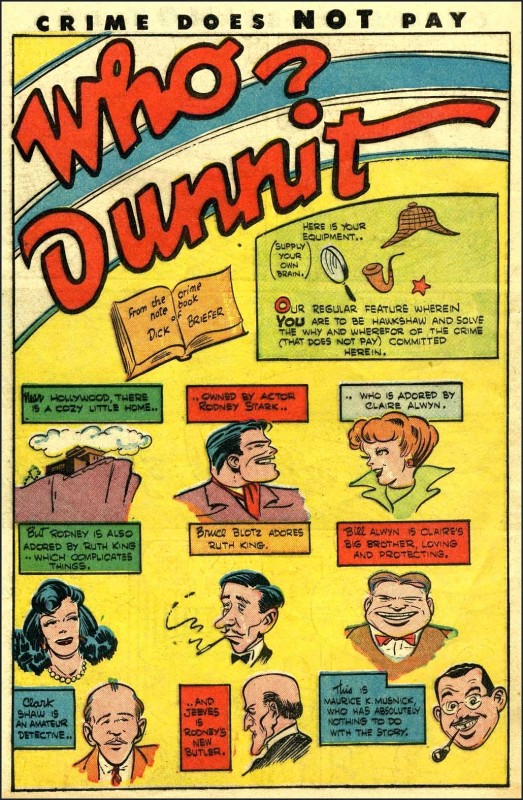Crime Does Not Pay–But I Had To! $26!
Crime Does Not Pay Archives Volume 1 (True Crime Graphic)
This is going to be an unusual review. In fact for a fully comprehensive one, please watch Tony Isabella”s blog!!!! http://tonyisabella.blogspot.com. I’m sure you will have one soon. You see, this is not the kind of comic book I would want to read. And I waited 50 years to read it. Let me explain.
As a child of the 1960s, there were very few books out about comic books and their history. The Google of the day was at the library where you could go through microfilm of magazines and newspapers after looking things up in a book index. When you googled, pardon me, looked up comics most of the articles were about the creation of the comics code they always referenced the EC line of comics and Crime Does Not Pay, mentioning that they showed the violence, gore and sex that would pervert children. In an era where there were no comic book stores these comics were almost totally unavailable to me. A decade later the EC line would be reprinted. But there was nothing for Crime Does Not Pay until now. So I finally get a peek at history!
The first volume covers its first four issues, 1942-1943. The stories are very well reproduced. Comics then we 64 pages, so four issues take up over 250 pages. While the cover tells you that these are all true crime stories, not all the stories here are really crime. There is a superhero story, of Hawkman type character named “War Eagle” which is probably not true either. Each issue leads off with a “true” character, Lepke, John Dillinger, Legs Diamond and Dutch Schultz, but this is really an anthology comic, featuring superheroes, minute mysteries which the readers must solve, and brief “whodunits.” There are stories about Billy The Kid, Pancho Villa, and, taking a western turn, Wild Bill Hickok. While some stories of course are better than others, it is not terribly consistent in terms of quality. There is a lot of violence, a lot of guns and shootings, some stabbings, and a few hatchets, but there is no real gore. If there’s any lesson to be taught and discussed throughout the book, is that committing even the smallest crime will lead to a life in crime where you will punished or killed, because crime does not pay! Ethnic stereotypes abound throughout the volume, African Americans, Asians, Germans, all have bad accents and are often drawn, well, badly. Issue #4 will introduce a narrator that will stay with the line.
There is art by some artists that I know like Frank Giacoia,”The Millen Farber Case,” Bob Montana, “Two Legged Rats,” and Carl Hubbell, “The Monster of Munsterberg,” Dick DeBriefer had the ironic “Corpses for Sale,” (which he bought for himself and when he created his Frankenstein) and George Tuska draws “The Mad Musician.” Other artists include Norman Maurer, Alan Mandel and Woody Hamilton, who I was unfamiliar with. Debriefer’s comic style was well suited here, but nothing else was compelling. The introduction by Matt Fraction, who was new to these stories too, gives us more details into the weird, crime-ridden life of writer Dick Wood.
My favorite part is the advertisements for stamps, cloths, telescopes, and Daredevil Comics.
Crime Does Not Pay (Paperback) $15
Here, 24 stories in over 200 pages of comics coming from issues #23 to #67, 1942-1948. The introductions are by Dennis Kitchen, and Brian Azzarello. Artists here include Dick Briefer, George Tuska, Fred Guardineer, Dan Barry, and Carmine Infantino.
More crime, killings, stabbings, robberies and so forth across mostly the United States, but occasionally Great Britain. The art here is better than the earliest issues in the hardcover. The ethnic stereotypes are getting a bit harder to take.
I have no idea how to rate this. In terms of my personal enjoyment, I would give this a D. these are just not my type of comics. They are repetitive, violent, pointless, not wonderfully drawn and don’t have any characters that I can relate to. It’s not very well written either. If you like these sorts of stories, check out the EC archives of Crime SuspenStories, which, for me were far superior.
But as part of comic book history, the reason why we have the comics code, what caused caused Frederick Wertham to write his book, these stories are invaluable. For comic book historians, collectors, and fans, I recommend getting one of these books.. But if you’re just looking for something interesting to read I’d go somewhere else.


